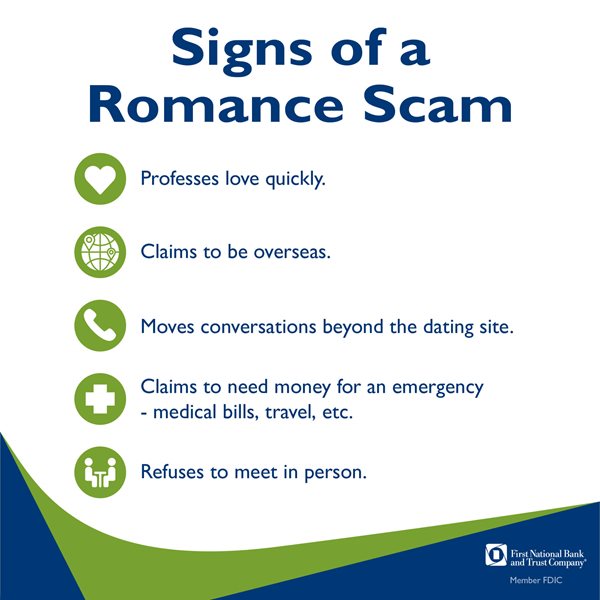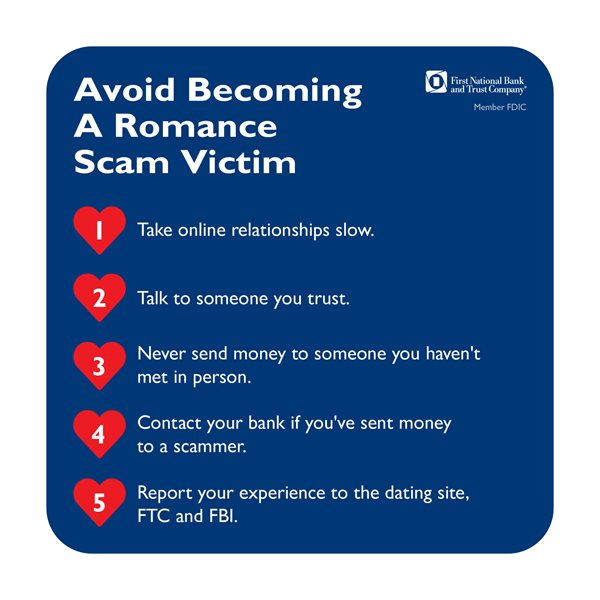Guarding Your Heart (and Wallet) Against Romance Scams
With so much love in the air leading up to Valentine’s Day, it can be all too easy fall prey to online dating scams. Here's how to spot a romance scam.

With so much love in the air leading up to Valentine’s Day, it can be all too easy to get swept off your feet and fall prey to online dating scams. In the past two years alone, the
FBI reports that Wisconsin residents have lost over $5 million to fraudsters posing as interested singles online. That’s why knowing the signs of an online romance scam can help protect you and your money from cybercriminals this year.
What Are Romance Scams?
Romance scams can happen both in the digital world and offline. But they typically take place online when a fraudster or cybercriminal tricks someone into a fake romantic relationship with the intention of stealing their money, identity, or personal information.
You may also see online dating scams referred to as “sweetheart scams” or catfishing, as everything the fraudster is doing is to trick you into believing they’re interested in you romantically.
How Do Online Dating Scams Work?
Scammers will set up fake profiles on popular dating or social media sites, then connect with their victim. They’ll often chat or message several times a day to build up a trusting relationship quickly.
Once they feel that they’ve gained your trust, they’ll typically invent a scenario in which they need money urgently—usually this is a medical, housing or travel emergency. They’ll start asking for your bank details or money, then disappear and move onto the next person as soon as you give them what they’re after.
Who Can Be a Victim of an Online Dating Scam?
Anyone can fall for a romance scam, but those actively looking for a relationship or companionship online are especially vulnerable. Scammers know this, so they actively target specific individuals like:
- Widows/widowers
- Divorcees
- Seniors
Women are more susceptible to dating scams, as are those in the 55 to 64 age group. Young people aren’t immune, though. Catfishing and online extortion can just as easily happen to young adults, too. Read more about
fraud targeting seniors.
Where Do Scammers Target Their Victims?
Most cybercriminals use online dating apps and websites to find new victims for their romance scams, but this isn’t the only place that you can get scammed out of your money or personal information.
Facebook, Instagram and other social media sites are equally as dangerous—you never know if someone is who they say they are. In 2021,
over 30% of dating scam victims reported that they met their fraudster on Facebook or Instagram.

Who Are These Online Scammers?
There’s no one-size-fits-all identity for cybercriminals. They can come from anywhere and operate all around the world. However, most are based outside the US and will cover up their foreign accent or time difference with an elaborate story as part of their fake identity.
What Lies Do Romance Scammers Tell?
Everything an online dating scammer tells you is a lie, but there are some tell-tale signs that you can look out for.
First, the scammer will tell you they’re either located far away from you, or that they’re local but travel for work often. This is to make meeting impossible, without you suspecting something. The most common lies around this are that they’re working:
- As an oil rig operator
- In the military and are deployed overseas
- On a construction project overseas
- As a doctor with an international aid organization
What Will Scammers Ask For?
Most online scammers will eventually ask you for money. This can be in the form of wiring them money,
sending a digital payment, reloading gift cards, or even asking for your bank details or to set up a new bank account and then sharing that information with them once you’ve deposited cash into the account.
They may ask you for money in other, less direct ways, such as paying for travel expenses like plane tickets, work visas or other travel documents. They may also ask you to help pay for medical expenses, a personal emergency, or to help them pay off existing debts like gambling, personal loans, or school tuition.
In some cases, the scammer could even make you a money mule, asking you to send them money that you’ll be receiving from someone else connected to them.
While many romance scammers try to get money directly from their victims through lies around needing help, extortion and blackmail are also used to force someone to hand over cash or their personal details.
This is particularly the case on online dating apps where users may share intimate photos or videos of themselves with matches, especially when the scammer promises to send their own in return. Instead, the scammer will use the images or videos that you’ve sent them and threaten to forward them to family, friends or even post them publicly unless you send them a ransom payment.
How To Spot a Romance Scam
Knowing who’s genuine and who might be a scammer is becoming increasingly more difficult to identify. If a profile looks too good to be true, or you find something suspicious, it’s best to follow those instincts and avoid that individual.
Scammers will often declare their love for you within a few days, or weeks, of starting up a conversation. But, due to them being overseas, they’ll always find a reason for the two of you not to meet in person. They may even agree to meet, but a sudden and unexpected event will come up so they won’t be able to meet after all. This is a significant red flag to look out for.
Someone you’ve never met in person asking you for money or gifts, especially in specific forms of payment, should also set your alarm bells ringing. Never send any money to someone you haven’t met in person and don’t share any personal information like logins or bank account details.

How to Avoid Online Dating Scams
Even when you know the red flags to look for, it’s still easy to be caught off-guard and become a victim of a romance scam. The most important point to remember is that you should always be careful about what personal information you’re sharing online, either on dating sites or social media.
If you do meet someone you’re interested in, do your homework. Look them up online and see if pictures of that person match with what you’re seeing. Do a reverse image search to see where else that picture might be used, inspect their profile carefully - look at who their friends are, or if their profile looks brand new. Go beyond the original source where you met this person and see if they have profiles anywhere else.
Always take any online relationship slowly and ask plenty of questions, just as you would when getting to know someone offline. Scammers will avoid sharing personal details that could expose them as much as possible. If they’re keeping tight-lipped, that’s a good indication that someone could be a scammer.
As with many online scams, cybercriminals will often use misspelled words or improper grammar. Read any messages carefully and always talk to your friends and family about someone new you’ve met online.
Finally, if someone is asking you for help, especially financial support, refer them to organizations that may be able to help rather than providing them with funding yourself.
Remember, if something feels wrong, trust your gut instincts, stay away and report the individual if you think they could be a scammer.
How to Report Romance Scams
If you think you may have been a victim of an online dating scam or are concerned that someone you’re speaking to online might be a scammer, you should file a report as soon as possible with the
Federal Trade Commission’s Fraud team, along with letting your bank know—this is particularly important if you’ve sent the scammer any money, or account details
If you paid someone via a gift card, contact the company that issued the card and report that you’ve been scammed. You may be able to claim a refund.
You can also report them to your local law enforcement and the website where you met the person. This can help prevent others from becoming victims of the same scanner in the future.
You can learn more about romance scams and how to avoid becoming a victim of online dating fraud at the
FBI’s website.